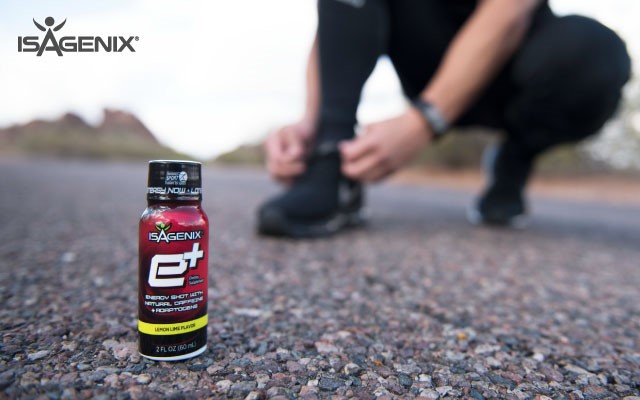One of our best-loved products at Isagenix is our e+™ energy shots, packed full of plant-based caffeine from green tea and yerba mate.
Caffeine is frequently used by elite athletes, and between 2004 and 2008 almost three quarters (74 percent) of doping samples contained measurable levels of caffeine (1). There’s research to support the use of caffeine to enhance performance in many different sport types, including endurance, muscular endurance, and repeated high-intensity exercise (2, 3).
Scientific studies have shown how caffeine can have a powerful effect on performance times. In time-trial studies on cyclists, researchers have shown improved completion times of as much as 3-5 percent following caffeine consumption (4, 5). In a sport where a small improvement in performance can be the difference between winning and losing, caffeine supplementation can provide that competitive edge.
There have been many research studies supporting the use of caffeine for runners. It’s well documented that caffeine improves time-trial times in events that last several hours as well as short duration high-intensity sprints (6).
However, you don’t have to be an elite athlete to see benefits from caffeine during your workout. Research has also been conducted in both well-trained and recreational runners in 5-kilometer time trials. Results showed that runners who ingested caffeine prior to racing saw an approximate 1 percent faster time (6).
Different people are likely to experience different benefits of caffeine before their training or competitive events. This response can be determined by both genetic and environmental factors, including how regularly they use caffeine. Studies have found that caffeine concentrations are elevated in the bloodstream as quickly as 15 minutes after consumption (7).
Whether you’re well experienced or just getting started on your exercise program, you can benefit from a caffeine boost before your workout. Next time you’re heading out on a run, bike ride, or hitting the gym, don’t forget to have a shot of your favorite caffeinated drink beforehand!
References
- Del Coso J, Muñoz G, Muñoz-Guerra J. Prevalence of caffeine use in elite athletes following its removal from the World Anti-Doping Agency list of banned substances. Appl Physiol Nutr Metab. 2011;36(4):555–61
- Burke LM. Caffeine and sports performance. Appl Physiol Nutr Metab. 2008;33(6):1319–34.
- Glaister M, Howatson G, Abraham CS, Lockey RA, Goodwin JE, Foley P, McInnes G. Caffeine supplementation and multiple sprint running performance. Med Sci Sports Exerc. 2008;40(10):1835–40.
- Desbrow B, Biddulph C, Devlin B, Grant GD, Anoopkumar-Dukie S, and Leveritt MD. The effects of different doses of caffeine on endurance cycling time trial performance. J Sports Sci. 2012; 30(2): 115-20.
- Hodgson AB, Randell RK, and Jeukendrup AE. The metabolic and performance effects of caffeine compared to coffee during endurance exercise. PLoS One. 2013 Apr; 8(4): e59561.
- O’Rourke MP, O’Brien BJ, Knez WL, and Paton CD. Caffeine has a small effect on 5-km running performance of well-trained and recreational runners. J Sci Med Sport. 2008 Apr 30;11(2):231-3.
- Pickering C, Kiely J. Are the current guidelines on caffeine use in sport optimal for everyone? Inter-individual variation in caffeine ergogenicity, and a move towards personalised sports nutrition. Sports Med 2018;48:7-16
The post How Can e+ Boost Your Performance? appeared first on Isagenix Health.
Source: IsagenixHealth.net


You May Also Like
Post-Workout Super Shake
Winter Trail Mix
Apple Spice Granola
IsaDelight Bark With Caramel Brulée Drizzle
Caramel Brulée Cookie Dough Bites
Homestyle Chicken Noodle Soup
BĒA Super Sparkler
Peppermint Mocha Shake
IsaDelight Cashew Butter Cups
Plant-Based Banana Bread
Nature Oat Bake Granola
Nature Oat Bake Isa-Cream Sandwiches
Nature Oat Bake Skewers
BEA Mango Mimosa Slushie
Plant-Based Strawberry Ice Cream
Plant-Based Strawberry Crepes
Plant-Based Strawberry Muffins
Superpower Elixir
Plant-Based Maple Pecan Protein Balls
Immune-Boosting Oats
Celebration BĒA Sparkler
Bone Broth Chicken Gravy
Kale & Sausage Bone Broth Soup
IsaDelight Reindeer Bark
Holiday Charcuterie Board
Leftover Turkey and Vegetable Soup
Protein Chocolate Mug Cake
Vanilla Protein Coffee Creamer
Greens Lavender Iced Matcha Latte
Isagenix Greens Salad Dressing
Everyday Ginger-Infused Cleanse Tea
Choco-Lava Mug Cake